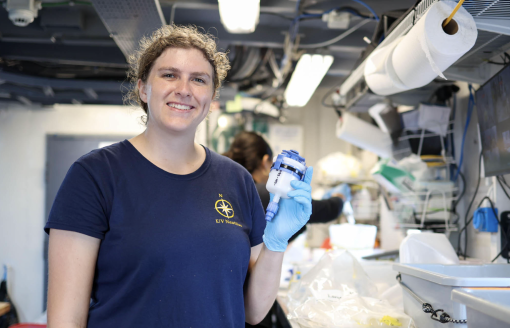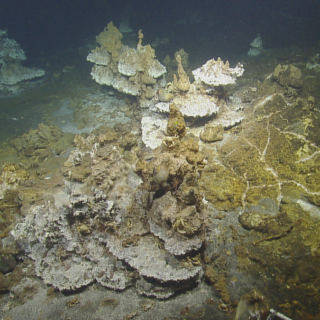Meet Ocean Explorer Ella Ashford

OET proudly welcomes Ella Ashford to the Corps of Exploration. Ashford is a NOAA Hollings Scholar and undergraduate student at Willamette University sailing on the NA164 expedition. We sat with her to learn more about this experience at sea and the path that led her to Nautilus.
We sat with her to learn more about this experience at sea and the path that led her to Nautilus.
Describe your role with OET.
This summer I have been interning at the National Marine Sanctuary of American Samoa through the NOAA Ernest F. Hollings Undergraduate Scholarship. My work at the sanctuary has involved expanding their ROV (Remotely Operated Vehicle) capacity and designing new methodologies to monitor mesophotic (deeper than 30m) zones. When National Marine Sanctuary of American Samoa research coordinator Val Brown and superintendent Atuatasi-Lelei Peau offered the chance to represent the sanctuary aboard the E/V Nautilus, I jumped on the opportunity! During the E Mamana Ou Gataifale I Expedition, I am part of both the science and communication teams. Working with the science team on this expedition has involved preparing and processing eDNA as well as water samples that are collected by DAP and Mesobot. On the communications side of the expedition, I have been working with the other interns on social media content and Ship to Shore interactions. One of the things I love most about life on the ship is that everyone has been incredibly inclusive during daily activities. As a result, you can often find me shadowing other personnel, like the navigation team, in my spare time!
Can you tell us a little about your background? What influenced you as a child?
One of the most influential experiences of my childhood was growing up on a small sailboat in Hawai'i. I could often be found dangling from the bowsprit gazing down at the sparkling ocean and daydreaming about the mysterious world that was under the waves. This quickly became a longing to peer beneath the surface waters to explore its depths, which eventually launched me into participating in the MATE (Marine Advanced Technology Education) ROV Competition. The challenge of completing underwater scientific tasks using an ROV, troubleshooting technical difficulties under strict time limits, and presenting our solutions to expert judges were just a few of the experiences that made me gravitate towards underwater robotics. However, it was when we got the chance to test our ROV in the ocean that I found myself in complete awe of the underwater world. I finally had received my chance to peer into the depths that had sparked my childhood curiosity and was spellbound as marine life cruised past our cameras and entire ecosystems came into view.
Another key experience for me was participating in Nautilus Live interactions during my middle and high school years. I can remember being at the edge of my seat, bursting with questions during the Q&A sessions while also completely caught up in the excitement that the ROV pilots created during their live streamed dives. Now, it has come full circle by having the opportunity to conduct ocean research on the E/V Nautilus, being on the other side of the camera sharing my story, and watching wide eyed students from around the world marvel at the mysteries that the crew aboard the Nautilus unveils!
When you were a kid, what did you want to be when you grew up?
When I was a kid I wanted to be an ‘animal rescuer’. It was my childhood dream come true, when during a chance encounter with a molting elephant seal on a busy city beach, I had the opportunity to become the youngest volunteer involved in NOAA’s West Coast Marine Mammal Stranding Network through the Port Townsend Marine Science Center (PTMSC). The PTMSC volunteers arrived at the site to find a spunky twelve-year-old educating passerbyers as to why keeping their distance from marine mammals was important. I spent my summer responding to calls about beached mammals, setting up education stations, and cordoning off the beaches where seals rested. Whenever I put on my official safety vest and neon orange volunteer hat, I felt like a professional who could educate locals, tourists, and even news reporters about the marine life we shared the beaches with. This experience is what made me discover the impact I could have by engaging in public outreach. My volunteer work led me to meet Dr. Jane Lubchenco, one of the previous administrators for NOAA, who took the time to talk with me and sign my beloved orange PTMSC volunteer hat after one of her presentations. Her passion, knowledge, and persistence inspired my young mind and encouraged me to pursue a new path in ocean science and exploration.
What would you consider to be your greatest challenge entering this field?
Willamette University, in the central valley of Oregon, may not have specific degrees in marine sciences or oceanography, but instead challenged me to go beyond the status quo to pursue opportunities outside of the classroom settings. This has included writing grants to lead my own research utilizing ROVs to recover derelict fishing gear, operating drones to map marble quarries in Greece, and even traveling across the world to the University of Otago in New Zealand for marine science courses and fieldwork! Additionally, my mentors, professors, and peers have unconditionally supported these aspirations, which has made all the difference. Through these experiences, I have learned that finding a supportive community is as important as a specific degree.
Do you have any advice for someone looking to follow a similar path?
My advice would be to put yourself out there and try new things! Don’t let application requirements or your level of experience stop you from chasing opportunities. I have found that meaningful connections and enthusiasm are just as crucial as specific skills.
What's next for your ocean studies and career?
Next up for me is finishing my senior year at Willamette University. After that I am planning on taking time to go sailing around the Pacific Ocean to various shores and opportunities. I will then pursue my graduate degree in a field related to ocean science and am particularly interested in understanding the ways that coastal regions and Pacific islands study and manage their marine resources using technology such as ROVs. Wherever my education and career take me, I hope to keep working toward a more sustainable, informed, and collaborative future in ocean stewardship.

E Mamana Ou Gataifale I - American Samoa
Over the last three years, the Ocean Exploration Cooperative Institute has been advancing the integration of multiple exploration technologies aboard E/V Nautilus, and this year, we bring these new capacities to American Samoa.



